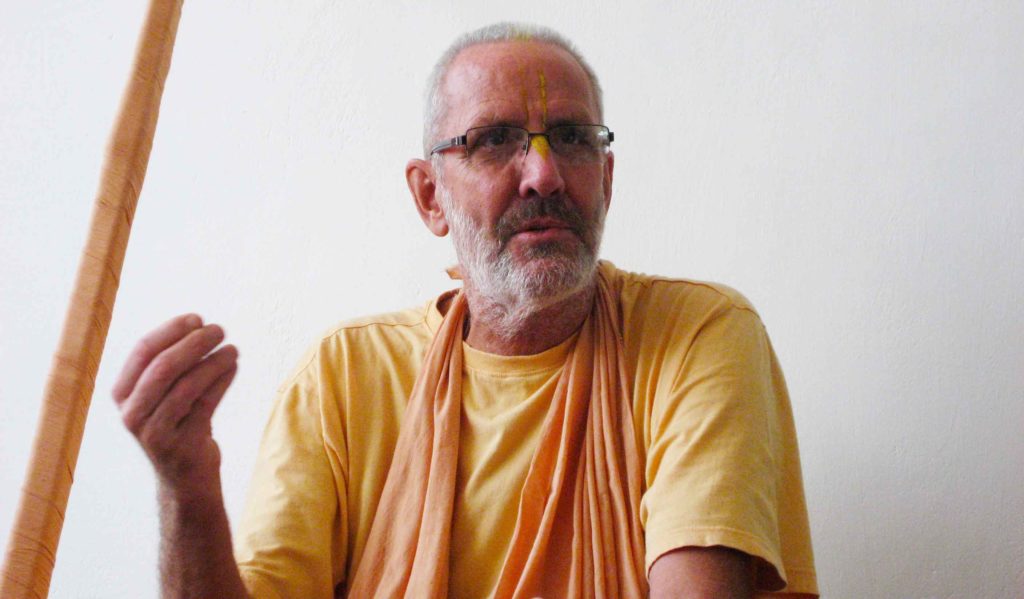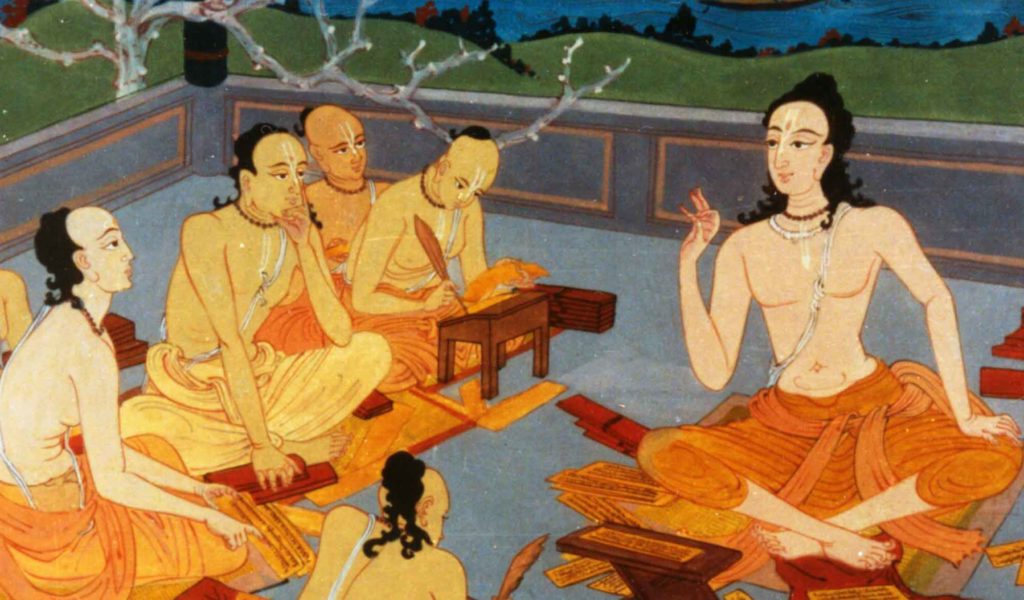Overview
In this article "Envy” from Sajjana Toṣaṇi Vol.4, Bhaktivinoda Ṭhākura deliberates upon envy according to the Vaiṣṇava perspective as a direct competitor to divine love (prema) and the harm it does to a practicing devotee. This article was translated by Swami B.V. Giri and Sanātana Dāsa.
The word ‘envy’ is applied in many places and is used in connection to various things – envy of another’s good fortune, being disturbed at seeing the wealth of others, displeasure and jealousy etc. are some of the various examples. Wherever the word envy (mātsarya) has been explained in the Vaiṣṇava scriptures, it is fully understood that its influence is the competitor of divine love (prema).
dharmaḥ projjhita-kaitavo ‘tra paramo nirmatsarāṇāṁ satām
“The path described in the Bhāgavatam is entirely devoid of any dishonest purpose. It is held in adoration by those who are free of the flaw of envy.” (Bhāg.1.1.2)
In these words of the Śrīmad Bhāgavatam, it has been revealed who is eligible to receive the highest conception of dharma. In the scriptures, it is indicated that prema-rasa is the topmost dharma. One who is non-envious is eligible to receive that. The quality of non-enviousness is called nirmatsarata. Although respected commentators have explained mātsarya as feeling miserable at seeing the happiness of others and taking pleasure in the sufferings of others, nevertheless, they have not revealed the broader meaning of this word and the general populace cannot understand it.
The ignorant baddha-jīvas are tightly bound in the material world by six things – lust, anger, greed, illusion, madness and envy. These are said to be the six categories. These are the transformations of the fivefold miseries – ignorance, forgetfulness, self-absorption, attachment and jealousy. Absorption in material objects in relation to the origin of lust has been explained in Śrīmad Bhagavad-gītā (2.62-63):
saṅgat sañjayate kāmaḥ
kāmāt krodho’bhijāyate
krodhād bhavati sammohaḥ
sammohāt smṛti-vibhramaḥ
smṛti-bhraṁśād buddhi-nāśo
buddhi-nāśāt praṇaśyati
“In association with material attachment, lust develops; from lust anger arises. From anger, delusion appears. Delusion means unlawful material greed. From material greed, moha or bewilderment of memory appears. From moha, intelligence is destroyed, which means that one becomes mad and bereft of the understanding of what is right and wrong. By madness one is destroyed which means that the living entity becomes ruined by envy.”
This instruction has also been mentioned (Gītā 3.43):
evaṁ buddheḥ paraṁ buddhvā
saṁstabhyātmānam ātmanā
jahi śatruṁ mahā-bāho
kāma-rūpaṁ durāsadam
“O mighty armed Arjuna, knowing that individual unit of consciousness to be superior to the intelligence, steady the mind with firm intelligence and conquer this indomitable enemy in the form of lust.”
Considering the jīva as fully spiritual, beyond intelligence, with determination and through proper siddhānta, by subduing the mind, one must conquer the formidable enemy of lust.
From all of these instructions, it can be understood that this sprout of lust, arising due to the misconception of one’s own svarūpa, in due course of its development, becomes transformed into the tree of enviousness, and thereby the dharma of the jīva, which is prema, remains inapproachable. There is lust in anger, and in greed there is anger as well as lust. In illusion there is anger and lust. In madness there is greed, anger and lust. In enviousness there is madness, illusion, greed, anger and lust. We may understand that the word ‘mada’ (insanity) refers to the six types of bewilderment which includes being intoxicated by one’s beauty, one’s caste, one’s education etc.
All sufferings of the jīva arise due to enviousness. Ignorance, the desire to commit sin, the desire to perform pious activities and impious activities – all of these are included within envy. On one side is Vaiṣṇava dharma, which refers to service to the Vaiṣṇavas, mercy to the living entities and a taste for the Holy Name – on the other side, is enviousness. Whoever feels pleasure at the distress of others can never display mercy to the jīvas. The sweet mood of love for the Lord cannot arise within him. He has innate hatred or enmity towards the Vaiṣṇava. Only those who are without envy can fully accept the purport of the tṛṇād api verse. Śrīman Mahāprabhu has spoken (in the third verse of Śikṣāṣṭakam):
tṛṇād api sunīcena taror api sahiṣṇunā
amāninā mānadena kīrtanīyaḥ sadā hariḥ
“One who is humbler than a blade of grass, more forbearing than a tree who gives due honour to others without desiring it for himself is qualified to always chant the holy name of Kṛṣṇa.” (Śikṣāṣṭakam 3)
One who is devoid of envy cannot have false pride due to wealth, material beauty, caste, education and material strength; therefore, he knows himself to be lower than a blade of grass. A non-envious person cannot be dominated by anger and cannot be envious towards others; therefore, he is more tolerant than a tree. In other words, he is most munificent. Being devoid of all false conceptions due to caste, education etc. a non-envious person becomes endowed with all good qualities and thus has no desire for name and fame. Thus he never expects any respect for himself. A non-envious person finds happiness in the happiness of others and is sad at the miseries of other; therefore he gives proper honour to all living beings. Generally, with mercy he shows respect to all jīvas; with proper honour he respects the brāhmaṇas; he appropriately satisfies those within the cultured section of society who have become somewhat inclined towards Vaisnavism, and he serves the lotus feet of the Vaiṣṇavas. By his very nature, the person who is without envy –
1) Does not make offences to sādhus.
2) Does not consider the demigods to be independent, for his intelligence is absorbed only in Kṛṣṇa, yet he does not disrespect them.
3) Shows appropriate respect to the spiritual preceptors.
4) Appropriately honours the bhakti-śāstras which includes the śrutis etc.
5) Gives up unnecessary arguments and develops the faith that nāma and nāmi are non-different. He considers the Holy Name as the highest worshipable reality.
6) Does not engage in sinful activities on the strength of the Holy Name.
7) Does not consider pious activities such as dharma, vows, austerities etc. to be equal to the Holy Name.
8) Makes an effort to develop faith in the faithless, but does not instruct them about the Holy Name until that faith has awakened.
9) Has complete faith in the glories of the Holy Name that is described in the śāstras.
10) Does not identify himself with material conceptions.
O readers! Non-enviousness alone is liberation and enviousness is entanglement. Thus, in Śrī Caitanya-caritāmṛta (Madhya 9. 361) it is said:
caitanya-caritra śuna śraddhā bhakti kari
mātsarya chāḍiyā mukhe bala hari hari
“Endowed with full faith and devotion, listen to the lifework of Śrī Caitanya. Cast aside envy and let your mouth sing, Hari, Hari!”
Prema Dhāma Deva Stotram with the Narasiṅgha Sevaka Commentary – Verses 61-65
In verses 61 to 65 of 'Prema Dhāma Deva Stotram', Śrīla Śrīdhara Mahārāja narrates the pastime of Śrī Caitanya at Caṭaka Parvata In Purī and explains how the scriptures produced by Brahmā and Śiva are ultimately searching for the personality of Mahāprabhu who is merciful too all jīvas, no matter what their social position.
Prabhupāda Śrīla Sarasvatī Ṭhākura’s Visit to Ayodhyā
With the forthcoming observance of Śrī Rāma Navamī, we present 'Prabhupāda Śrīla Sarasvatī Ṭhākura’s Visit to Ayodhyā' written by Śrīla Bhaktisiddhānta Sarasvatī Ṭhākura Prabhupāda from The Gaudīyā magazine, Vol 3. Issue 21/ In December 1924, after visiting Benares and Prāyāga, Sarasvatī Ṭhākura visited the birth-site of Śrī Rāmācandra in Ayodhyā.
Śaraṇāgati – The Only Path to Auspiciousness
In this article, 'Śaraṇāgati - The Only Path to Auspiciousness', Dhīra Lalitā Dāsī analyses the process of śaraṇāgati (surrender) beginning with śraddhā (faith). She also discusses the role of śāstra and the Vaiṣṇava in connection with surrender.
Ātma Samīkṣā – The Value of Introspection
In this article, "Ātma Samīkṣā – The Value of Introspection" Kalki Dāsa highlights the importance of introspection in the life of a devotee and especially in relation to the worldly environment that surrounds us. He also explains how transcendental sound influences our capacity to introspect.
Prema Dhāma Deva Stotram with the Narasiṅgha Sevaka Commentary – Verses 61-65
In verses 61 to 65 of 'Prema Dhāma Deva Stotram', Śrīla Śrīdhara Mahārāja narrates the pastime of Śrī Caitanya at Caṭaka Parvata In Purī and explains how the scriptures produced by Brahmā and Śiva are ultimately searching for the personality of Mahāprabhu who is merciful too all jīvas, no matter what their social position.
Prabhupāda Śrīla Sarasvatī Ṭhākura’s Visit to Ayodhyā
With the forthcoming observance of Śrī Rāma Navamī, we present 'Prabhupāda Śrīla Sarasvatī Ṭhākura’s Visit to Ayodhyā' written by Śrīla Bhaktisiddhānta Sarasvatī Ṭhākura Prabhupāda from The Gaudīyā magazine, Vol 3. Issue 21/ In December 1924, after visiting Benares and Prāyāga, Sarasvatī Ṭhākura visited the birth-site of Śrī Rāmācandra in Ayodhyā.
Śaraṇāgati – The Only Path to Auspiciousness
In this article, 'Śaraṇāgati - The Only Path to Auspiciousness', Dhīra Lalitā Dāsī analyses the process of śaraṇāgati (surrender) beginning with śraddhā (faith). She also discusses the role of śāstra and the Vaiṣṇava in connection with surrender.
Ātma Samīkṣā – The Value of Introspection
In this article, "Ātma Samīkṣā – The Value of Introspection" Kalki Dāsa highlights the importance of introspection in the life of a devotee and especially in relation to the worldly environment that surrounds us. He also explains how transcendental sound influences our capacity to introspect.








